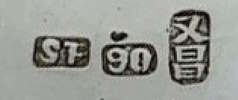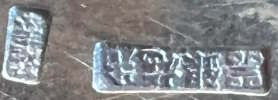CHINESE EXPORT SILVER
By the late 18th/early 19th centuries, the phenomenon we now know as Chinese Export Silver was well-entrenched. It happened simply because silver, as a material, was more plentiful in China than anywhere else and the art of silversmithing had been perfected to such a high level. It was also relatively cheap, compared to Western counterparts.
This capability was quick to be recognized; merchants and sea-captains began to bring western silver items as examples to be copied, while the demand for bespoke items also increased. It is because of this surge of requests to "copy" that we find a peculiarly Chinese Export Silver circumstance mainly in relation to silver created in the 1785/1840 period.
The phenomenon is often referred to as "pseudo-hallmarks" and most Chinese silversmiths adopted them. But, initially they did so unwittingly, since when they were asked to faithfully copy items brought from the West, many of them had British hallmarks - and so the silversmiths copied "faithfully" hallmarks and all! Yet, not fully understanding the significance of the information these marks imparted, a degree of artistic license was applied; date letters were replaced by a letter that might have been the first Latin letter of the silversmith's name, often using local transcribing. Nearly all silver created during this period was of Western form.
It is during the 1840/1880 period of Chinese Export Silver making we see a change in appearance of the silver produced and the marks makers used on them. Chinese motifs begin to appear on items. It is also during this period we see more silversmiths appearing. Makers' marks also changed in as much as some makers began to use marks that combined Latin initials of the maker along with a mark in Chinese characters or ideograms of the actual artisan silversmith that carried out the work under the roof of the master silversmith. This latter mark is known as the "chopmark". This indicates that makers probably ran workshops where several experienced silver makers operated until the master artisan silversmith,the man behind the Chinese chopmark, finished it.
The 1880/1940 manufacturing period of Chinese Export Silver is where we find a larger number of known silversmiths operating. As with the preceding periods, makers' marks are equally non-consistent in format.
In any case, keep in mind that name or initials in Latin characters are not the name of the actual maker. They will almost certainly identify the retail silversmith or, more correctly, the name under which he trades.
A - B -C - D - E - F
G - H - I - J - K
L - M - N - O - P - Q - R - S
T - U - V - W - X - Y - Z
|
CHINESE EXPORT SILVER MAKER'S MARKS
L - M - N - O - P - Q - R - S
|
 Feng Xiang (Lao Feng Xiang) Feng Xiang (Lao Feng Xiang)

|
(Lao Feng Xiang) Feng Xiang - Shanghai
 (Chinese name)
(Chinese name)
active mid 19th (possibly earlier) to present day
|
|
L

|
Linchong (Lin Chong) - New China Street, Canton
active c.1790-1850
|
|
LAINCHANG

|
Lianchang? - Shanghai
the maker using the mark LAINCHANG is unknown. Possibly the mark refers to Lianchang, active in Shanghai c. 1900-1940
|
 Lao Tian Bao Lao Tian Bao

|
Lao Tian Bao - Hankou

(Chinese name)
|
|
LC LEECHING

|
Leeching
Canton, East Street; Canton, Sai Hing Kai; Canton, Club Street, Honam Is; Hong Kong, Queens Road; Hong Kong, 24A Queens Road; Shanghai, Nanking Road
 (Chinese name)
(Chinese name)
active c.1840-1900
|
LEO

|
unidentified, Canton
active c.1825-1875
|
|
LH


|
Luen Hing, 231 Szechuen Road, Shanghai
active c.1875 - 1930
|
 (Liang Shun Chi) (Liang Shun Chi)

|
Liang Shun Chi - Hong Kong (possibly)
 (Chinese name)
(Chinese name)
active early 20th century (possibly)
|
|
LOCK

|
Lock Hing - Canton, Hong Kong & Shanghai
 (Chinese name)
(Chinese name)
active c.1880-1915
|
|
LW LUEN WO





|
Luen Wo - Canton & Shanghai
 (Chinese name)
(Chinese name)
active c.1865-1920
|
|
MB

|
unidentified - Canton
active 1825-1850
|
|
MH

|
unidentified - Canton (possibly)
|
|
MK

|
unidentified - Canton
active 1825-1875
|
|
NK

|
unidentified - Nanking (possibly)
active late 19th/early 20th century (possibly)
|
|
OS

|
unidentified, possibly Onn Sing
|
|
PC

|
Po Cheng (possibly) - Hong Kong (possibly)
active late 19th/early 20th century (possibly)
|
|
PL

|
unidentified
|
 Powing (or Pao Ing) Powing (or Pao Ing)

|
Powing (or Pao Ing) - Canton
active c.1775 - 1820

(Chinese name)
| |
SHENG YUAN

|
Sheng Yuan
active c.1900
|
|
SF


|
Sing Fat - Canton & Hong Kong
in partnership with Wing Fat (WF) c. 1870-1930
 (Chinese name)
(Chinese name)
active c.1850-1930
|
 Sincere and Company (Shih Hsien) Sincere and Company (Shih Hsien)


|
Sincere and Company (Shih Hsien) - Canton, Hong Kong, Shanghai and Peking
active c.1875 - 1935
Sincere Department Store is a department store under the Sincere Company Limited and one of the oldest department chains in Hong Kong. Prior to 1949, its largest operation was in Shanghai, and along with Wing On (which survives in Hong Kong), Sun Sun (1926/1951) and Da Sun was one of the "four great department stores" of Shanghai

(Chinese name)
| |
SS



|
Sunshing, New China Street, Canton
active c. 1790-1830
|
|
S.S

|
Sun Shing, Canton and 90 Queens Road Central New China Street, Hong Kong
active c. 1840-1910
|
CHINESE EXPORT SILVER MAKERS
A - B -C - D - E - F
G - H - I - J - K
L - M - N - O - P - Q - R - S
T - U - V - W - X - Y - Z
|
|
|

www.silvercollection.it |
This is a page of A Small Collection of Antique Silver and Objects of vertu, a 1500 pages richly illustrated website offering all you need to know about antique silver, sterling silver, silverplate, Sheffield plate, electroplate silver, silverware, flatware, tea services and tea complements, marks and hallmarks, articles, books, auction catalogs, famous silversmiths (Tiffany, Gorham, Jensen, Elkington), history, oddities ...
HOME - SITE MAP - SILVER DICTIONARY - COOKIES CONSENT AND PRIVACY |
| |